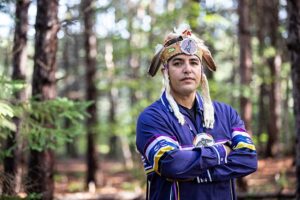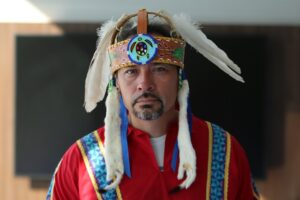Anishinabek Nation leadership call on federal government to extend deadline for all Indian Day School Settlement claims

By Rick Garrick
ANISHINABEK NATION TERRITORY — The Anishinabek Nation leadership is calling on the federal government to extend the deadline for all, submitting a claim for the Indian Day School Settlement due to issues claimants are experiencing.
Currently, a claimant can apply for a six-month extension; however, this puts the onus on the claimant and it is not granted to all. Anishinabek Nation Grand Council Chief Reg Niganobe sent a letter to Attorney General David Lametti on Feb. 10 calling on the federal government to extend the claim filing deadline by one year to July 2023 due to delays caused by the COVID-19 pandemic and the failure to create a process that effectively assists and supports survivors in accessing compensation. There were about 56 Indian Day Schools within Anishinabek Nation territory. This letter has since been forwarded to Prime Minister Justin Trudeau.
“There has to be an extension — our ability to access records and other legal documents, it’s time-sensitive and it can’t be done efficiently, and even to build the strength and the courage to share our stories requires time and healing as well,” says Anishinabek Nation Lake Huron Regional Deputy Grand Council Chief Travis Boissoneau. “There has been a national push … to make the request to extend the deadline for all, not just those to take on the burden of requesting an individual extension.”

Regional Deputy Grand Council Chief Boissoneau also reiterated three of the four other concerns brought up by Grand Chief Niganobe in his Feb. 10 letter to Lametti, including that any Survivor who has filed a claim and had it reviewed should be able to submit additional evidence/documents at any point in support of their claim prior to a decision being rendered on their final compensation entitlement.
“Any Survivor who has received their final compensation but has additional information and documents that would increase their compensation entitlement should be permitted to file the additional information,” Regional Deputy Grand Council Chief Boissoneau says.
He adds that is one of the major issues with the Indian Day School Settlement claim process.
“There are many factors which encourage Survivors and their representatives to apply for the lowest level. Then once people learn and understand the process or feel more comfortable facing their trauma, after they’ve [applied for the first level and received compensation], they’re not allowed to go back and amend their application or resubmit at a higher level.”
Regional Deputy Grand Council Chief Boissoneau says the requirement for documentary evidence to support a claim should be construed in the most liberal manner possible in recognition that documentary proof of harm can be difficult to gather.
“And again, that goes to the sworn statements for the level of harm the claimant believe they experienced— claimants are provided the opportunity to provide sworn statements but then their sworn statements are challenged and their claims are being dropped to a lower level, and then being able to prove their requested level, proves to be difficult and disheartening.”
Lake Huron Regional Deputy Grand Council Chief Boissoneau adds that Anishinabek Nation leadership have been hearing concerns from citizens and community Chief’s about the Indian Day School Settlement claim process.
“We’re looking into legal options on how to address this as a whole,” he says. “We’re trying to find ways legally to make sure our citizens are heard and how we can support others across Turtle Island advocating for amendments and equitable access to justice for all under this settlement.”
Grand Council Chief Niganobe had also called on the federal government in his letter to provide funding to the Anishinabek Nation to support Survivors, including, but not limited to the following ways: community outreach and education about the existence of the settlement, educating about entitlements for Survivors and the compensation process; assisting Survivors in filing claims, including assisting in securing documentary evidence, filing supplementary evidence and navigating the process for an appeal under the claims process; and ensuring the accessibility of culturally-appropriate supports for Survivors as they navigate through the traumatic process of reliving their Day School experiences to seek just compensation.
“There are mental wellness supports available through this settlement,” says Kelsey Anger, interim Boonenindiwin/Reconciliation Manager at the Anishinabek Nation. “But it’s important to note and respect that Survivors may not feel comfortable accessing those supports and what they may want is support within their community— they may want a more culturally-sensitive and Anishinaabe-centered means of healing.”
Anger says many Survivors are turning to their community resources for support, not just with mental wellness support, but also general assistance with navigating the claim process. Unfortunately, communities are finding that they are already at capacity and cannot meet these needs.
“Some supports within the communities simply can’t keep up,” Anger says. “So what we have done within the Anishinabek Nation is we’ve reached out to class counsel (Gowling WLG) to see if there was support for us to hire a local individual to focus on this specifically and we were told to utilize the resources available through the settlement.”
Anger says the Anishinabek Nation has taken it upon themselves to hire a navigator on a one-year contract to assist Survivors with the Indian Day School Settlement claim process. Additionally, it has increased its Community Assistance Support (CAP), a phone and virtual wellness and counselling support available free to all Anishinabek Nation member First Nations citizens.
A federal government official says the Federal Indian Day School Settlement is an out-of-court resolution to a national class action in an Apr. 5 e-mail response to a request for comments.
“Therefore, outreach and education to class members and communities is undertaken as required in the Federal Court-approved Notice Plan to ensure consistent messaging to class members,” says Jennifer Cooper, media relations at Crown-Indigenous Relations and Northern Affairs Canada, in the e-mail. “This Notice Plan provides key information to class members and their families through a variety of avenues including direct communication with Indigenous communities, band offices, community centres, friendship centres, Indigenous local governments offices, regional and national Indigenous governments.”
Cooper says that Canada recognizes that any process that involves revisiting past abuse can be very difficult for Survivors.
“Those affected by experiences with a federal day school, either direct or intergenerational, are able to access cultural, emotional and mental health support services,” Cooper says. “These health support services include cultural and emotional health supports provided by a skilled, Indigenous, community-based workforce and mental health supports provided by provincially/territorially regulated mental health providers, such as psychologists and social workers.”
Cooper says Survivors and their families requiring immediate assistance can also access the Hope for Wellness Help Line, which offers immediate access to culturally safe crisis intervention for all First Nation, Inuit and Métis people across Canada to help those who are in distress, having a strong emotional reaction, or are triggered by painful memories.
“This support is in addition to the $200 million provided to the McLean Day Schools Settlement Corporation for legacy projects to support commemoration projects, health and wellness programs, truth-telling events and the restoration and preservation of Indigenous languages and culture,” Cooper says. “As part of the Agreement, Canada has also provided significant funding to support class members filing a claim for compensation. This includes funding to class counsel, Gowling WLG, to provide ongoing legal services to class members, free of charge, throughout the claims process. Gowling WLG is providing these supports online, over the phone and, when safe to do so, by visiting communities.”
Cooper adds that Canada has also provided funding to support the claims administrator, Deloitte, which is available to assist class members with completing their claims form, and the Claims Assistance Program, which was approved by the Federal Court of Canada to provide culturally sensitive, in-person and virtual support to communities across the country to help claimants complete claim forms.


